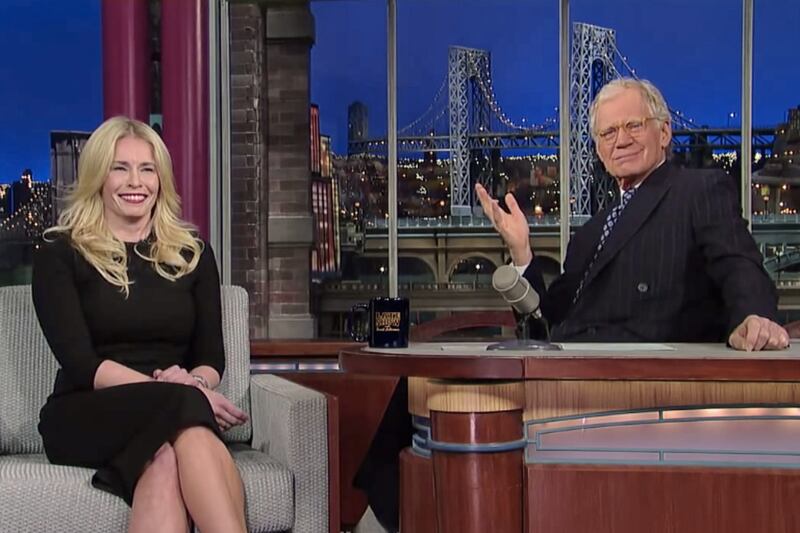David Letterman announced Thursday that he will retire next year after more than two decades of hosting CBS’s Late Show. As one of the most revered hosts in late-night television history, he will be leaving some very large shoes for the next host to fill in 2015.

It’s high time that they be a pair of heels.
Amid the well-deserved outpouring of praise and nostalgia for Letterman, CBS should recognize the golden opportunity it has to break through a male-dominated history of late-night television. In fact, “opportunity” is not the right word; “necessity” is more like it. Men, largely white, yukking it up with Bradley Cooper and politely flirting with Jennifer Lawrence or Megan Fox won’t suffice anymore.
Since its inception, the late-night television show has been almost universally a boys’ club. Steve Allen became the first host of NBC’s Tonight Show when it premiered in 1954, and since then, there has been a lot of the same: men in suits. Letterman, Fallon, Meyers, Ferguson, O’Brien, Kimmel, Stewart, and Colbert all offer a bit of variety in age, and Arsenio Hall added an albeit brief chapter of diversity as the first black late-night comedy host (and he is back on the air). But the parade of men in suits generally feels stale. It’s not even that the late-night landscape is like stepping into a jock-centric locker-room; it’s more like walking into a moth-eaten Elks lodge, especially when it comes to network television.
The absence of females in late-night television is palpable, just as Saturday Night Live’s dearth of black female cast members was prior to the hiring of Sasheer Zamata. And just as with SNL, the late-night landscape will ultimately be held back from greater entertainment potential until it makes a female addition. It’s all the more perplexing considering that the most successful awards show hosts in recent memory have been women: Ellen DeGeneres, Tina Fey, and Amy Poehler have killed it where Ricky Gervais, Seth Macfarlane, and even the beloved Billy Crystal have recently left us bored, offended, and, most importantly, not laughing.
There have been two notable exceptions to the male-dominated late-night history. One is Joan Rivers, who started hosting her own late-night show on Fox in 1986 in the channel’s early days. While her show had a strong premiere, it was canceled within eight months. One of the main problems with the show is that acid-tongued Rivers decided—perhaps under executive pressure—to tone it down and play it friendly as a regular late-night host. As NBC Chief Fred Silverman said at the time, “As the dash of Tabasco sauce on The Tonight Show, she [Rivers] was great. But when she was on every week, it was like eating a meal with six courses—and it’s all whipped cream. People don’t want to see a nice Joan Rivers.”
Being too nice has never been a problem for the other female exception, Chelsea Handler, and it may be why she’s successfully pulled off an eight-season-long late-night run on E! The sharp-tongued blonde won fans with her crass, ballsy humor—and it’s exactly for that reason she may be the perfect successor to Letterman.
Sure, the two comedians could not be more different in their approaches. Letterman is a senior-citizen-aged lanky Midwesterner who is clever but never too edgy with his guests. Handler is a thirty-something, attractive blonde who has made a career out of shocking audiences and sharing stories of her own drunkenness and one-night-stands.
But if CBS is going to be the network that breaks the glass ceiling—and it’s in its best interest to do so—it needs to go big or go home. Milquetoast is safe, but it often doesn’t cut it. (See Katie Couric as the first female nightly news anchor as proof.) That proscription goes double for comedy, and especially late-night.
Certainly, there are concerns that Handler’s more abrasive humor could either rub people the wrong way or end up being artificially watered-down as Rivers was. Yet unlike Rivers, Handler’s humor isn’t as mean for the sake of being mean. There’s a smartness and purpose under her sharpness. At the same time, she doesn’t become an immediate sycophant when she’s interviewing a celebrity. If Rivers was compared to late night’s Tabasco sauce, Handler is Sriracha, the spicier and trendier versions. And late night could use a splash to kick things up.




